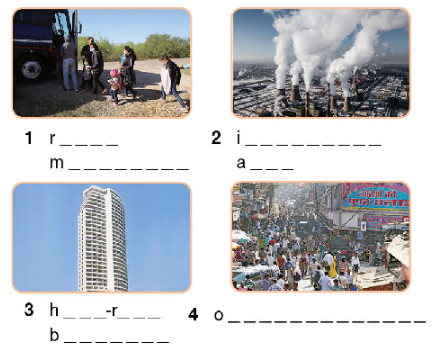Vocabulary (Từ vựng)
Rural - urban migration (Sự di cư từ nông thôn lên thành phố)
5. Choose the correct option.
(Chọn đáp án đúng.)
1. Low wages/access may force people to leave their towns or villages.
2. Lack of public/recreational activities makes young people move to cities.
3. Access to goods/industries and services is available but sometimes expensive in cities.
4. Crop infrastructure/failure may be due to global warming.
5. There are more industries/goods in a megacity, which creates more jobs.
6. Poor infrastructure/access in rural areas leads people to big cites.
- wage (n): tiền công (thường theo tuần)
- access (n): sự tiếp cận
- recreational (adj): thuộc về giải trí
- goods (n): hàng hóa
- industry (n): ngành công nghiệp
- infrastructure (n): cơ sở hạ tầng
- failure (n): mất (… mùa)

1. Low wages may force people to leave their towns or villages.
(Lương thấp có lẽ ép buộc mọi người rời thị trấn hoặc làng của họ.)
2. Lack of recreational activities makes young people move to cities.
(Việc thiếu hụt các hoạt động giải trí khiến các bạn trẻ di chuyển lên thành phố.)
3. Access to goods and services is available but sometimes expensive in cities.
(Việc tiếp cận hàng hóa và dịch vụ thì luôn có sẵn nhưng đôi khi lại đắt đỏ ở các thành phố lớn.)
4. Crop failure may be due to global warming.
(Mất mùa có thể do sự nóng lên toàn cầu.)
5. There are more industries in a megacity, which creates more jobs.
(Có rất nhiều ngành công nghiệp ở một siêu đô thị, điều này tạo ra nhiều công việc hơn.)
6. Poor infrastructure in rural areas leads people to big cites.
(Cơ sở hạ tầng kém ở các vùng nông thôn khiến người ta đến các thành phố lớn.)

Các bài tập cùng chuyên đề
1. Listen and repeat. (Nghe và lặp lại.)
1. rural migration (n): sự di cư về các thành phố lớn
2. overpopulation (n): quá tải dân số
3. slum (n): khu ổ chuột
4. industrial area (n): khu công nghiệp
5. high-rise building (n): toà nhà cao tầng
6. megacity (n): siêu đô thị
2. Complete the statements with the words/phrases (1-6) from Exercise 1.
(Hoàn thành các phát biểu sau với các từ/ cụm từ (1-6) từ bài tập 1.)
1. This part of the city is a(n) _____ with lots of factories.
2. Some poor people ended up living in a(n) _____ because they couldn't afford proper housing.
3. _____ can cause lots of trouble on public transport in a city, especially during rush hour.
4. _____ happens when people move to the city from the countryside to find better jobs.
5. People who live in the centre of a(n) _____ may take hours to get around.
6. The city council plans to construct a new _____ in a suburb of Newcastle to provide more housing.
a. Match the words to the definitions.
(Nối các từ với các định nghĩa.)
|
1. population density |
A. the process of towns and cities growing as people move to them from rural places |
|
2. grid |
B. someone who moves from one place to another |
|
3. urbanization |
C. the amount of space covered by a piece of land |
|
4. housing |
D. places where people can live |
|
5. migrant |
E. the number of people living in a particular amount of space |
|
6. upgrade |
F. replace a machine or a system with something better or improve it |
|
7. area |
G. a system of wires or pipes used to power a large area |
b. Read and fill in the blanks.
(Đọc và điền vào chỗ trống.)
|
migrants population density area housing upgraded urbanization grid |
(1) ___ is caused by (2) ___ moving into a town or a city, and it isn't always a good thing. Sometimes, the (3) ___ can get too high and cause problems because there are so many people. One thing it can affect is the (4) ___ . There might not be enough apartments or houses in a certain (5) ___ , so people won't have anywhere to live. It often means that the town or city's infrastructure has to be (6) ___ This can include building more hospitals and apartments, as well as improving the power (7) _______
a) Look at the pictures and fill in the missing letters.
(Nhìn vào các bức tranh và điền vào các chữ cái còn thiếu.)

6. Fill in each gap with infrastructure, recreational, failure, industries, goods or wages.
(Điền vào mỗi chỗ trống với infrastructure, recreational, failure, industries, goods hoặc wages.)
A: Hey John! How are you doing?
B: I'm alright. You know what? I'm thinking of moving to the city.
A: Why is that? Are you going to leave the quiet life of our village?
B: Well, although I like the peaceful and slow pace of life here, I must go. 1) _____ are higher in the city and there are more 2) _____ activities there.
A: Are you sure about that? I know there are very few job opportunities here, but the locals are well-mannered and caring, and you live a life that's far from stressful.
B: I really love the beautiful things in our town, but after the last crop 3) _____ I have no choice but to go to a big urban centre. There are certainly more 4) _____ that offer employment, and the city has better 5) _____ and public services than our rural area. I hope to get a job soon and find a spacious flat.
A: I hope you can afford all the 6) _____ the city can offer!







Danh sách bình luận